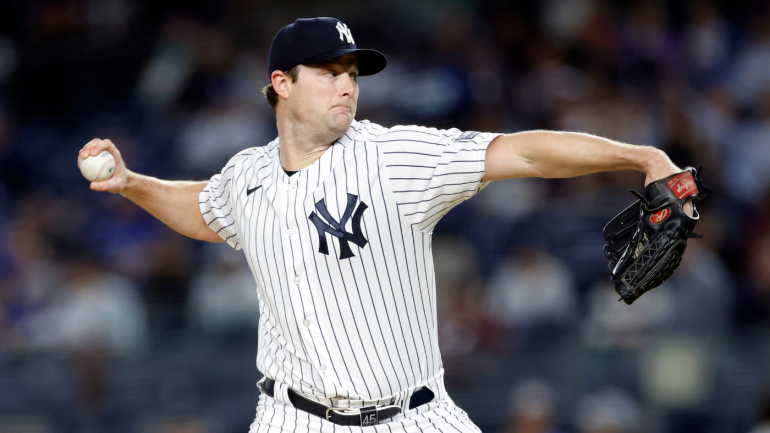
Not much went right for the New York Yankees in 2023. They missed the postseason with an 82-80 record that represents their worst season in three decades. Aaron Judge ran into the Dodger Stadium wall and missed two months, Carlos Rodón pitched poorly when he wasn't hurt, and others up and down the roster didn't pull their weight. It was a rough year in the Bronx.
One thing went very right for the Yankees in 2023 though: Gerrit Cole. Cole threw 209 innings and led the American League in ERA (2.63), ERA+ (165), and WHIP (0.98). He led all pitchers with 7.4 WAR -- Blake Snell was a distant second at 6.0 WAR -- and won his first Cy Young award. Cole's five top-five finishes in the voting were the most ever for a pitcher before winning his first Cy Young.
"I'm very proud of this season," Cole said after winning the Cy Young (per MLB.com). "I'm very proud of some of the other seasons where I made a pretty strong run at this award as well. There was a lot of momentum going into this."
Last season was the fourth season on Cole's then-record nine-year, $324 million contract. That was the largest contract ever given to a pitcher at the time and Cole held the record until this offseason, when the Los Angeles Dodgers handed Yoshinobu Yamamoto a $325 million contract. Here are the richest pitcher contracts in baseball history in terms of total guarantee (we'll leave Shohei Ohtani in his own category):
- Yoshinobu Yamamoto, Dodgers: $325 million
- Gerrit Cole, Yankees: $324 million
- Stephen Strasburg, Nationals: $245 million
- David Price, Red Sox: $217 million
- Clayton Kershaw, Dodgers: $215 million
The Yankees made a run at Yamamoto as well, reportedly offering 10 years and $300 million. They offered a larger average annual value than the Dodgers and an earlier opt out, but, at the end of the day, the Yankees offered fewer years and fewer dollars, and fewer years and fewer dollars rarely wins in free agency. New York pivoted to Marcus Stroman a few weeks later.
According to the New York Post, one reason the Yankees declined to raise their offer to Yamamoto is they don't believe any pitcher (particularly one who has yet to throw an MLB pitch) should have a larger contract than Cole, the reigning Cy Young winner.
Yankees decided not to match Dodgers winning $325M bid to Yamamoto because: 1) they thought $300M was right offer, 2) they didn’t believe anyone should have a bigger deal than Gerrit Cole. NYY offered optout after 5 yrs but not a $50M signing bonus. Highly unlikely it mattered.
— Jon Heyman (@JonHeyman) December 23, 2023
That's a nice sentiment, though Yamamoto broke Cole's record anyway, so I'm not sure the Yankees proved their point. Also, Cole is a hardcore union guy who was on the MLBPA's executive board for years and thanked Curt Flood and Marvin Miller during his introductory press conference. He figures to be happy to see the contract bar moved up. But I digress.
Ultimately, Yamamoto's record may only last one season. Cole's contract includes an opt out after the 2024 season, and the Yankees can void that opt out by picking up a one-year club option worth $36 million. Essentially, Cole can force the Yankees to add an extra year to his contract, making it a 10-year deal worth $360 million, thus reclaiming the record from Yamamoto.
The Yankees did something similar with CC Sabathia and Aroldis Chapman back in the day. Sabathia had an opt out in his contract after 2011 and he leveraged it into a one-year extension. Chapman had an opt out after 2019 and similarly turned it into a one-year extension. The Yankees are in the same boat with Cole, only they negotiated the extension terms ahead of time.
Sabathia's opt out in particular loomed over the Yankees the entire 2011 season. It was a stressful year for the organization. With Cole, the Yankees have peace of mind. They know that, even if their ace uses his opt out, they can simply exercise the club option to keep him. No such assurance existed with Sabathia. He could have become a free agent and left the Yankees.
Cole, 33, does not need to win another Cy Young to use the opt out. He has a long track record of excellence and durability, plus he's a vital member of the organization. Even a good but not truly great season along the lines of his 2022 -- 3.50 ERA in 200 2/3 innings -- would be more than enough to justify using the opt out and forcing the Yankees to add the 10th year to the contract.
The most likely scenario is Cole uses the opt out and the Yankees pick up the club option to keep him. That is not the only scenario though, and this decision may not be as simple as it appears. Let's run down some other ways this could play out.
Cole declines to use the opt out
The possibility exists that Cole could make more money by not opting out. His contract runs through 2028, his age-37 season. At 37, Max Scherzer signed a two-year, $86.6 million deal with the New York Mets. Justin Verlander received the same contract as Scherzer at age 40. The going rate for elite starters on short-term contracts, even aging ones, is north of $40 million a year.
Cole could decline to use his opt out and thus pass on the Yankees' $36 million in 2029, and instead seek a Scherzer/Verlander contract after his original nine-year contract is up. And who knows what the market will look like come 2029? By then, the going rate for a Hall-of-Fame-bound starter could be closer to $50 million. Two years of that is better than one year of $36 million, no?
There is, of course, a ton of risk with this strategy. So much could happen between 2025-28 to sap Cole's earning power. He could get hurt, his performance could decline, so on and so forth. That said, Cole has already made a fortune, so he is well-positioned to roll the dice. Passing on the opt out/club option in 2024 in hopes of a bigger payday in 2029 is not insane.
Cole uses his opt out and re-signs with the Yankees
The competitive balance tax is baseball's soft salary cap and many teams treat it as an upper limit on payroll. The Yankees do not. They routinely spend well north of the CBT threshold, though it definitely limits their spending to some degree. New York would likely run much higher payrolls than they have the last few years if they weren't being hit with eight-figure tax bills each year.
The CBT payroll is calculated using the average annual value of each player's contract. Cole's nine-year, $324 million deal works out to $36 million annually. Is it possible Cole uses his opt out after the 2024 season and returns to the Yankees on a contract that puts more money in his pocket, but also lowers his annual CBT hit? That would help the Yankees improve the team around him.
If Cole opts out and the Yankees pick up the club option, he would have five years and $180 million remaining on his contract, which is again $36 million a year. Instead of that, could they agree to a new contract like, say, seven years and $210 million? That's more years and more money for Cole (through his age-39 season) and a reduced $30 million annual CBT number for the Yankees.
There is also the possibility of deferred money. After using the opt out, Cole and the Yankees could agree to a new contract that includes deferrals and lowers the CBT number further. Point is, there is a scenario in which Cole uses the opt out, the Yankees decline the club option, and they still stay together with a contract that is more favorable for both sides.
The Yankees let Cole walk
Is it at all possible that, after Cole uses the opt out, the Yankees decline the club option and let him leave as a free agent? I think it is extraordinarily unlikely but the odds are not 0%. I see two ways it could happen:
1. The Yankees have a disaster 2024 season, call it something like 72-90, and decide they need to rebuild or retool or whatever you want to call it. In that case, Cole opting out would be a chance to clear $36 million a year off the books from 2025-28, when the organization may be in the down period as they retool (and thus not equipped to take advantage of Cole's production).
2. The Yankees decide they can only afford Cole or Juan Soto moving forward, not both. In that case, they could let Cole walk and spend big to re-sign Soto, who will be a free agent after this coming season. Objectively, letting the 34-year-old pitcher leave so you can re-sign the 26-year-old top of the line hitter is the smart move.
No. 1 seems unlikely to me even with the Yankees coming off their worst season in three decades. For better or worse, this franchise doesn't do rebuilds. No. 2? Yeah, I suppose that's possible, though I don't think the Yankees traded for Soto with the knowledge that re-signing him would require shedding significant dollars, so much so that letting Cole walk is a viable option.
Cole and agent Scott Boras had the opt out/club option put in his contract for a reason, and that's so they could use it to put as much money in his pocket as possible. The market has changed since Cole signed his deal -- Scherzer and Verlander signed their $40-plus-million a year contracts a few years later -- though $36 million is still a hefty salary.
Barring a catastrophic injury in 2024, the smart money is on Cole using the opt out and the Yankees picking up the club option. It is possible things could play out differently, however, with the Yankees and Cole reuniting on a more CBT friendly contract far, far more likely than the Yankees letting Cole, their ace and essentially their co-captain with Judge, walk away.




















